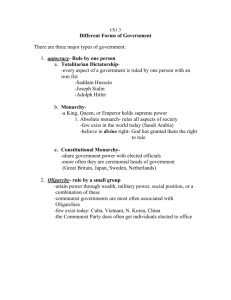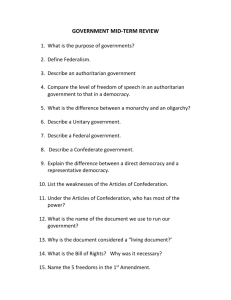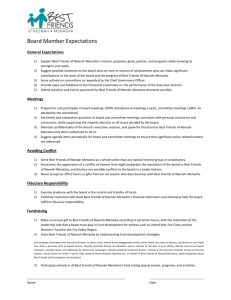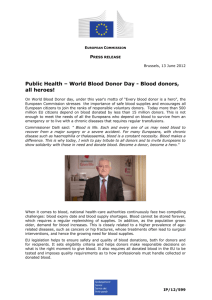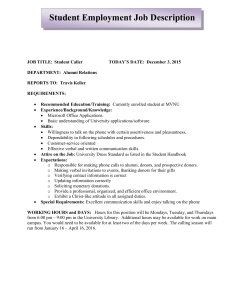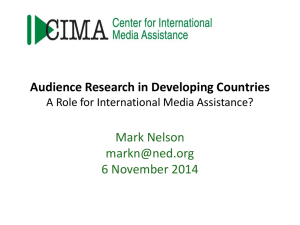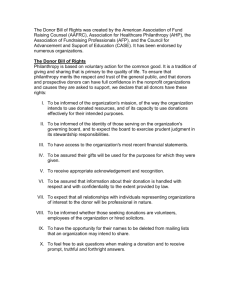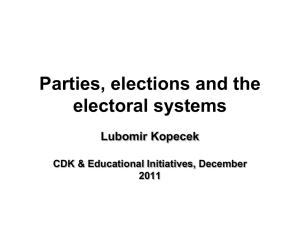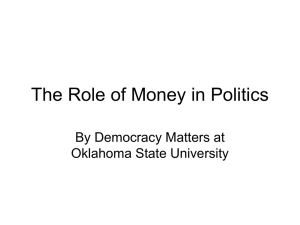Chapter 1 - Democracy Matters
advertisement
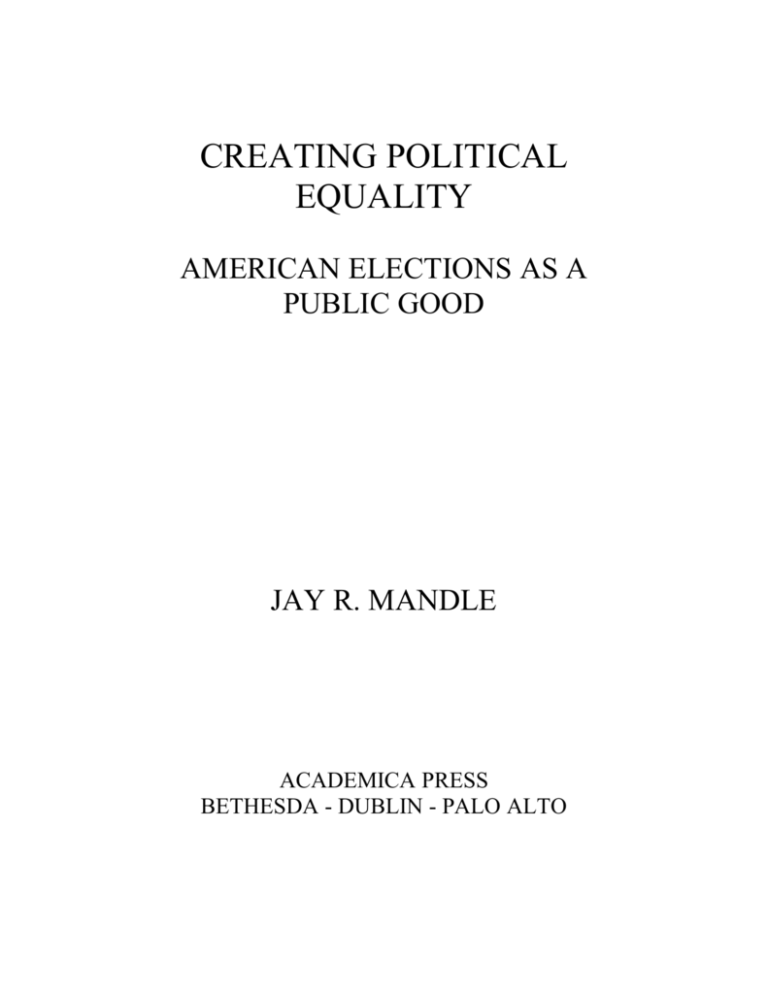
CREATING POLITICAL EQUALITY AMERICAN ELECTIONS AS A PUBLIC GOOD JAY R. MANDLE ACADEMICA PRESS BETHESDA - DUBLIN - PALO ALTO Preface When I first became interested in political campaign finance, I was surprised to learn that this was a subject without a theory. To be sure, journalistic accounts of how political campaigns are paid for are abundant. Almost all discussions of the American political system make note of the fact that efforts to secure elected office are expensive and invariably are paid for by a wealthy minority of the population. But models have not been offered that can provide insight into the consequences for democracy that result from our system of private campaign financing. Similarly, there exist no systematic considerations of how the content of democracy would be influenced if a system of public funding were utilized. As a result of these omissions we lack a deep understanding of the contemporary possibilities of democracy. In particular, we do not have a theory of how we might achieve a greater degree of equality in our political system than we possess at present. My intention with this book is to begin to fill that analytic void. I do so by maintaining that the electoral system shares many of the characteristics of a public good and that since it does, political campaigns should be paid for with tax revenues. My argument is that a political system funded by everyone will be more just than one in which candidates for office are required to tap a relative handful of private individuals for financing. But I hope that this book will do more than contribute to an academic dialogue and represent an advance in democratic theory. My purpose in writing it is also to be of assistance to activists who are engaged in the political effort to make the American political system fairer. I do so as a co-founder in 2000 of the campus-based reform organization, Democracy Matters. Largely financed by my adopted son, Adonal Foyle, from his earnings as a player in the National Basketball Association, Democracy Matters has attracted the support of large Preface iii numbers of college students eager to construct a political system of greater equality and fairness than the one that exists today. My involvement with Democracy Matters has been both a source of inspiration and a means by which my own perspective on the subject has been clarified. On-going discussions, particularly at the organization’s annual student “Summits,” have allowed me to try out my ideas and revise them as needed, all the while drawing on the energy and enthusiasm that DM students have in abundance. Advocates of social justice in the United States lack a unifying vision. Certainly people on the political left in this country do not possess an effective counter-thrust to the conservative mantra that the society benefits to the extent that the role of the government is reduced. As I argue in this work, that claim is demonstrably false with regard to the substantive issues of global climate change, health care reform, and financial sector regulation. But the absence of an alternative formulation to match the conservative appeal to a miniaturized government has handicapped those who would move the country in a progressive direction. My suggestion is that such an alternative might be to call for political equality to be achieved through the public funding of election campaigns. Accomplishing that objective would reduce the power of wealth in politics and enhance citizen influence. With that, the likelihood of the enactment of equitable legislation in areas of critical concern would be much enhanced. In writing this book, and in addition to the contribution from discussions with Democracy Matters activists, I have benefited from suggestions made by Lou Ferleger and Jon Mandle. Burt Weltman read the chapters as I drafted them and supplied me with detailed comments on each. That I did not always do as he suggested is not a negative commentary on the value I place on his views. Joan D. Mandle, the Executive Director of Democracy Matters, has been even more intimately involved in this project. She provided me with detailed feedback on iv Preface everything I wrote. But even before writing, I tried out my ideas and discarded or incorporated them in large part in response to her advice. Finally, a note concerning the book’s dedication. Paul Lyons was a lifelong friend and political collaborator. No two people ever started their analyses from such different sensibilities, only to arrive - nearly always - at the same political conclusions. I am certain that if he were still alive his commentary on the manuscript would have been rich and textured. Paul’s premature death is an irretrievable loss. Chapter 1 The Theory of Elections as a Public Good Elections are the mechanisms by which government officials in a democracy not only ascend to their positions but also are held accountable for their actions. With elections, voters can either choose continuity in their political representation or opt to send new people to office to implement public policy innovations. Elections provide the means by which citizens articulate their policy preferences. An efficient representative system is one in which the sentiments of an enfranchised citizenry are closely reflected in legislative outcomes. Democracy requires elections, but running for office requires resources. The electoral process is not immune to the economist’s rule that there is no free lunch. Efforts by candidates to make their views known have to be paid for. At the most elementary level, posters require paper that has to be bought and paint that has a price. Even if an artist donates his or her labor, the finished placards must be distributed, involving transportation costs. More realistically, in contemporary society the process by which voters become acquainted with the choices they have in electing representatives is fabulously expensive. Television is the medium through which most people learn about public issues and form their opinions. But even a minimal television advertising campaign racks up costs in the many thousands of dollars. Since electoral campaigns are not free, money to pay for them must be mobilized by office-seekers. In order to have a reasonable chance of success, candidates must either themselves have sufficient wealth to 2 Chapter 1: The Theory of Elections as a Public Good finance their efforts, have access to donors who are willing to provide those resources, or be provided with public funds. If candidates are unable to raise enough money, their election chances are doomed. Without sufficient financing they will not be able to communicate adequately with the electorate, ruining their chances for victory. Very rarely do citizens vote for candidates with whom they are unfamiliar. The economics of the electoral process therefore is an important determinant of the range of views and candidates presented to the electorate. For there to be a democracy in which a wide array of viewpoints is debated, a political financing system that facilitates extensive candidate participation is essential. Thus, the way office-seekers are financed goes a long way in determining the efficiency of the electoral process. The funding system determines the extent to which a wide variety of opinions and potential candidates can be effectively presented to the voters, enabling them to choose those whose views most closely reflect their own. Despite its obvious importance, however, the economics of the electoral system is a subject that has been neglected by scholars. I know of no systematic or comparative discussion that considers the extent to which alternative systems of electoral funding influence political outcomes. The result is a gaping void in democratic theory. Without a consideration of how the mechanisms of campaign funding influence political results, we cannot possess a full understanding of how democracy can or should function. Even the theorist most associated with the view that politics is a marketlike phenomenon, Joseph A. Schumpeter, failed to fill this vacuum. The role of the electorate in Schumpeter’s model of democracy is to choose among candidates, all of whom have been socialized for political leadership. The process of selection, in Schumpeter’s model, is done in the market-like system of the electoral process. Thus Schumpeter approvingly quotes a politician’s comment: “What businessmen do not understand is that exactly as they are dealing in oil, so Chapter 1: The Theory of Elections as a Public Good 3 I am doing in votes.”1 As Tom Bottomore puts it, Schumpeter “formulates an economic definition of democracy, conceived as an institutional arrangement like the market, in which various groups and individuals – equivalent to enterprises and entrepreneurs – compete for the votes of electors, the political ‘consumers.’”2 What Schumpeter called for was the creation of a professional class of politicians upon whom responsibility for policies would rest. Socialized as an exclusive “social stratum” and thereby endowed “with a professional code and a common fund of views,” they could be relied upon not to stray far beyond a cautious political orthodoxy. Policy formation in this way would be left to the office-holding politicians and not emanate from the voters themselves. Schumpeter writes: “the deciding of issues by the electorate [is] secondary to the election of the men who are to do the deciding.”3 His idea of democracy then was designed to use the market for votes as a way, in John Dunn’s words, to place “massively effective barriers between the feckless decisions of individual citizens and the consequential choices of those whom they select to rule.”4 Schumpeter’s market analogy, however, is at best incomplete. Though voters do provide votes, they do not provide revenue. In economic theory, the composition of output – the products that firms supply - is ultimately decided by consumers because they pay for the products they purchase. Their choices and the money they spend in support of those choices determine what is profitable for firms to produce and bring to the market. Consumers and their consumption decisions dictate output. But in politics, while office-seekers do compete for votes and the electorate chooses among candidates, those voters do not pay bills. People at the polls do not provide the funds that allow candidates to mount political races. Because voters – even if thought of as consumers in a political marketplace 1 Joseph A. Schumpeter, Capitalism, Socialism and Democracy, (First edition, 1942; New York, HarperPerennial, 1976) p. 285. 2 Tom Bottomore, “Introduction,” Joseph A. Schumpeter, Capitalism, Socialism and Democracy, p. xi. 3 Joseph A. Schumpter, Capitalism, Socialism and Democracy, p. 261, 290, 269. 4 John Dunn, “Conclusion,” in John Dunn (ed.) Democracy: The Unfinished Journey, 508 BC to AD 1993 (Oxford: Oxford University Press, 1992), p. 260. 4 Chapter 1: The Theory of Elections as a Public Good – do not provide resources to office-seekers, they only partially determine who prevails politically. To be sure, no candidate can ignore the preferences of the voters. The electorate does determine who wins elections. But that power is shared with donors – the people who provide the cash with which candidates mount their campaigns. Voters are not given the choice of voting for a candidate who cannot raise adequate campaign funds, and providing such funds is not the function of the electorate. Just as politicians cannot be indifferent to the wishes of the people who vote, so it is also the case that they cannot ignore the views of the people who pay for their campaigns. The latter in fact determine the extent to which they are able to campaign. It is true that no funder, however deep his or her pockets, can induce a politician to adopt a position that will result in certain electoral defeat. But it is also the case that no political aspirant can fail to take into account the preferences of political contributors. Because Schumpeter neglects the funding issue, his model also ignores the implications of the fact that the political process shares the characteristics of “public goods.” As in economic theory’s definition of the latter, the political process produces a socially-needed service that affects more people than actually pay for it. A form of “free-riding” therefore prevails. Only voluntary donors provide the resources to pay for political campaigns. Free-riding occurs when producers are unable to confine the use of their output to the people who actually pay them, and where consumers are unable to prevent non-payers from sharing their purchases. Economic theory teaches that when these circumstances prevail, markets are undersupplied. Free-riding reduces the profitability of production and therefore product availability. But cast in a different perspective, the fact that some individuals are willing to pay for an output that is shared with non-payers can be seen as endowing market power to those who avoid the temptation to free-ride. Because such individuals are willing to compensate the producers, they are able to exercise Chapter 1: The Theory of Elections as a Public Good 5 influence over the nature and quality of the product in question. It is one thing to say that the market for shared products is undersupplied. But to the extent that such products nevertheless are made available, power can be exercised by the willing compensators. Particularly when sharing is wide-spread, producers will be sensitive to the preferences of those who pay. The latter are the former’s only source of income. In both economics textbooks and the world of policy-making, this imbalance in influence is avoided by having public goods – products or services whose characteristics mean that by necessity they are shared - paid for by the government. Examples are the providing of roads and highways, police services and national security. The assumption is that in cases like these, free-riding is unavoidable and that furthermore those willing should not be permitted to exercise disproportionate influence over their availability. This is the rationale, as a case in point, for the way the government’s defense budget is paid for. Consider what would happen if defense were paid for privately. Who would foot the bill? Two sources of funds would be possible. One would be from those individuals who choose to contribute to the defense budget for philanthropic and/or patriotic reasons. While not ruling out the possibility that a great number of citizens might well decide to voluntarily contribute, it is unlikely that sufficient funds could be raised from this source alone to adequately defend the country. This insufficiency would emerge because if defense were to depend upon voluntary contributions, many people would be tempted not to pay. Instead they would count on others to provide the funds while they receive the benefits: in short to free ride. In the face of a resulting shortfall, those in charge of the country’s defense would have to appeal to a second potential pool of donors in addition to those who voluntarily contribute for patriotic reasons. These would be potential contributors who, in making a defense donation and supporting the nation’s security, would seek to advance their own private interests as well. Successful 6 Chapter 1: The Theory of Elections as a Public Good fundraising among this group would largely be determined by the extent to which national security administrators could creditably promise to cater to the funders. But in servicing the interests of this second group of donors, defense outlays would in all likelihood become inefficient. Instead of expenditures being measured exclusively by the criterion of achieving national security, that goal would be counter-balanced, at least to some extent, by parochial concerns. Defense fundraisers would have to respond to the preferences of potential funders, whether or not those preferences represented an effective way to achieve national security. Equipment might be purchased based on supplier interests rather than military necessity, or military bases located according to donor preferences rather than sound strategic considerations. The scope for waste and abuse would be extensive. The remarkable fact is that though it is widely recognized that the provision of public goods such as defense or road construction should not be privately financed, that same recognition is not extended to the most obviously shared process, politics. This omission exists despite the fact that the same mechanism that would produce inefficiencies and distortions with regard to the defense budget exists when elections are paid for privately. Politics shares the characteristics of public goods since elected officials legislate for everyone – for non-donors and supporters of defeated candidates as well as for the people who vote for and finance the victors. A person who possesses no electoral or financial responsibility for a program or law is no less bound by a political outcome than is someone who votes for a victorious candidate or who helped pay for that victory. But since electoral campaigns are not provided with public funds, those who make financial contributions are able to exercise disproportionate influence over the content of policies that affect the entire citizenry. Politicians are more responsive to those who provide financing than to those who do not. Chapter 1: The Theory of Elections as a Public Good 7 Such a relationship of reciprocity between donor and candidate does not imply illegality. Its presence simply means that people do not give away their money for no reason and that the recipients will feel at least some degree of obligation to those who underwrite their career successes. In making political contributions, funders increase the likelihood that an objective they seek will be accomplished. Donors are buying an enhanced probability of a candidate’s providing them with a desired service. The problem with this method of funding lies in the fact that with it the preferences of the electorate as a whole are not given the same weight in political decision-making as those who make political contributions. The conflict between private and public interests can be quite stark. Private donors might, for example, expect that in exchange for their funds the office-seeker will adjust his or her legislative votes to satisfy them. Alternatively, and probably more frequently, donors may simply purchase enhanced access to the candidate and with that the opportunity to develop an informal and perhaps influential relationship. A third possibility is that the donor may see in the candidate an incumbent or a potential elected official with whom there is already a shared agreement on policy. In this case, the contribution is made to increase the probability of that candidate’s success, a success that would advance the donor’s legislative preferences. Whatever its specific form, a reciprocal relationship is involved. The office-seeker needs what the donor can provide - funds. In return, the political contributor attempts to enhance the likelihood that his or her views will be expressed as public policy. In this mutually advantageous relationship, the wider set of interests present in the society is relegated to a status subordinate to the concerns of campaign donors. Private contributors then are the political counterparts to investors that firms depend on to finance their production and growth. Like those investors, donors make resources available to candidates who need money to compete effectively. In providing such funds, contributors are using their wealth to 8 Chapter 1: The Theory of Elections as a Public Good underwrite a risky project in the hope that they will reap an adequate reward. A campaign contribution is a bet made by an individual that the recipient will not only mount an effective campaign and be elected to office, but also will help to supply the legislative outcomes that are supportive of the donor’s interests. What differentiates these activities from normal market behavior is that legislative outcomes are not confined to the donors, but affect the lives of every citizen.5 Table 1.1 Mean Campaign Expenditures in 1982-84 prices, 1974-2006 Year 1974 1978 1982 1986 1990 1994 1998 2002 2006 House of Representatives 108,284 167,853 236,332 269,710 246,103 296,819 338,935 410,066 493,883 Senate 887,387 1,459,210 1,846,440 2,497,991 1,979,813 2,694,074 2,316,273 2,524,071 3,929,621 Source: Norman J. Ornstein, Thomas E. Mann and Michael J. Malbin, Vital Statistics on Congress 2008, (Washington D.C: Brookings Institution Press, 2008) Tables 3-2 and 3-5. Current dollar expenditures deflated using “Purchasing Power of the Dollar: 1950-2007,” U.S. Census Bureau, Statistical Abstract of the United States: 2009 (Washington D.C. 2008) Table 702. The importance of how campaigns are funded becomes more significant as they become increasingly expensive. As indicated in Table 1.1, electoral costs in races for a 2006 seat in Congress were, after adjusting for inflation, more than four times higher than they had been in 1974. In and of itself this large increase would not necessarily be alarming. If these sums were raised from a widening 5 Stephen Ansolabehere, John M. deFigueiredo and James M. Snyder Jr. see political contributions as acts of consumption rather than, as here, investment. See their “Why is There So Little Money in U.S. Politics,” The Journal of Economic Perspectives, Vol. 17, no. 1 (Winter, 2003) pp. 105130. Chapter 1: The Theory of Elections as a Public Good 9 contributor base, the increased cost of running for office might in fact represent a diversification of the donor pool and a democratization of the political process. But if the donor pool remained roughly the same, then the increase in campaign expenditures would represent the reverse. In that case, increased contributions from a still-limited number of donors would enhance the political leverage of those private benefactors. And that in fact is what happened. No one data source provides complete information concerning the nature of the donor population. The American National Studies Guide to Public Opinion and Electoral Behavior supplies a continuous time series on the percentage of the population that reported making donations to candidates or parties. In addition, The Center for Responsive Politics (CRP) works with reports provided by candidates to the Federal Election Commission (FEC) to estimate the population of contributors. But since the FEC requires that only donations in excess of $200 be itemized, this source omits donors who contributed less than that amount. Further, the CRP data extends back only to 1990. Finally, only a limited amount of survey data are available that supply information concerning the wealth and political attitudes of donors. Regardless of the source however, no one doubts that the percentage of the American population that makes political contributions is quite low: in a typical year less than 10 percent. Even more dramatically, the percentage that makes contributions of at least $200 is miniscule, always less than 1 percent (Table 1.2). This small sub-set provided between 80 and 90 percent of the funds received by candidates for the House of Representatives and the Senate in the elections held from 2000 to 2006. As of this writing, survey data on this subject are not yet available for 2008. But in light of Barack Obama’s emphasis on small donors during his presidential campaign, it is probable that both the percentage of the population that provided political contributions and the proportion of 10 Chapter 1: The Theory of Elections as a Public Good Table 1.2 Percent of Population Contributing to a Political Campaign and Percentage of Adult Population Contributing $200 or More to a Political Campaign, 1974-2006 Year Percent Contributing 1974 1978 1982 1986 1990 1994 1998 2002 2006 8 13 9 10 7 6 7 11 NA Percent Contributing $200 or More NA NA NA NA 0.15 0.22 0.24 0.30 0.36 Source: Percent Adult Population that Gave Money: The ANES Guide to Public Opinion and Electoral Behavior, http://www.electionstudies.org/nesguide/totable/tab6b _5.htm; Center for Responsive Politics, “Donor Demographics,” http://www.opensecrets.org. the population that donated small amounts of money were higher in the 2008 electoral cycle than in the past. Even so, it remains the case that providing political donations involves only a small proportion of the electorate. The problem is that the small slice of the population that makes substantial political contributions is far from a representative sample of the American people. Table 1.3 provides the data from a 1996 survey of Congressional donors. The results are clear. “Significant donors” – donors who contributed at least $200 to a candidate or party - are richer, better educated, and employed in more prestigious occupations than the population as a whole. In each case the gap is large. While 44 percent of the population was educated to the level of a high school degree or less, almost half of the campaign donors possessed graduate or Chapter 1: The Theory of Elections as a Public Good 11 Table 1.3 Demographic Characteristics of Political Donors and All Citizens Donors All Citizens Graduate Degree 49 10 High School or Less 5 44 $50,000 or Less 4 65 Above $100,000 78 8 92 15 6 85 Education Income Occupation Business Executive and Professionals Not Professional Executive and Professionals Source: Peter L. Francia, John C. Green, Paul S. Herrnson, Lynda W. Powell, and Clyce Wilcox, The Financiers of Congressional Elections: Investors, Ideologues and Intimates (New York: Columbia University Press, 2003), Table 2.4, p. 28. professional degrees. Paralleling this, while almost all donors were either business people or professionals, only 15 percent of the population worked in those occupational categories. Not surprisingly therefore, the income gap between donors and the population as a whole is wide. Just about two-thirds of the population earned $50,000 or less while only 4 percent of donors fit that category. More than three-quarters of donors earned $100,000 or more. It is no understatement to conclude, as Francia et al do, that donors constitute “an elite 12 Chapter 1: The Theory of Elections as a Public Good population.” They write: “If the donor pool looked like America, one might not care that a small number of donors provide so much of the funding….” But in fact, as they put it, “the donor pool clearly looks like an ‘upper class choir.’”6 The population of political contributors does not resemble anything like a crosssection of the American electorate. The political process is funded by an elite that thereby gains the power to shape political outcomes to its own advantage. This view of elite donor domination in policy formation is reinforced by Larry M. Bartels’ recent research on representation in the American political system. Using Senatorial roll call data and public opinion surveys, Bartels sets for himself the task of first identifying whether United States Senators were more responsive to the views of their wealthy compared to their non-wealthy constituents, and secondly, why this was the case. With regard to the first, the findings are stark. Bartels writes that his statistical results imply that Senatorial roll call votes “were quite responsive to the ideological views of their middle- and high-income constituents. In contrast, the view of low-income constituents had no discernible impact on the voting behavior of their senators.” When Bartels attempted to find the source of this representational disparity he discovered little or no explanatory power among the variables that political scientists conventionally employ when discussing this subject. He writes that his “results provide surprisingly strong and consistent evidence that the biases I have identified in Senators’ responsiveness to rich and poor constituents are not primarily due to differences between rich and poor constituents in turnout, political knowledge or contacting.”7 Bartels does not formally test the hypothesis that this disparity in representation is the consequence of the fact that wealthy people make most of the political contributions while middle and low income people make relatively few. 6 Peter L. Francia, John C. Green, Paul S. Herrnson, Lynda W. Powell, and Clyde Wilcox, The Financiers of Congressional Elections: Investors, Ideologues and Intimates (New York: Columbia University Press, 2003) p. 29, 27. 7 Larry M. Bartels, Unequal Democracy: The Political Economy of the New Gilded Age (Princeton and Oxford: Princeton University Press, 2008) p. 257, 260. Emphasis in original. Chapter 1: The Theory of Elections as a Public Good 13 He does provide some limited evidence that this is the case, but the thrust of his discussion is to emphasize the importance of political contributions because other explanations fail. He does not believe that the differences in influence result from the wealthy having higher voting turn-out rates, or because they are better informed about issues than the poor. Differences in the frequency with which affluent and non-affluent people contact office holders do exist, though as Bartels writes, it “is far from the whole story.” Rather, “the even simpler assumption that the rich are more influential than the poor because they provide the contributions that fuel contemporary campaigning and lobbying activities receives somewhat stronger support,” though he concedes that that support is “quite indirect.”8 Both theory and evidence then suggest that because the electoral process shares the characteristics of a public good, the fact that it is paid for privately empowers donors to exercise disproportionate influence over the content of political outcomes. The conclusion that follows is that if a democracy requires an accurate representation of citizens’ preferences, elections should be treated in the same way as the defense budget. To be fair – that is to be efficient - public funds should be used to pay the expenses involved when candidates run for office. If the electoral process were financed as a public good, with taxes being used to pay for electoral campaigns, the funding elite’s privileged opportunity to invest in and thereby shape United States politics would be lost. Politicians would no longer owe their incumbency to donors as well as to the electorate. Elected officials and challengers would not have to consider the risk to their funding that would occur if they endorsed the positions of middle and low income voters. Those voters, who at the moment are underrepresented because they do not make financial contributions, would find a voice and a level of influence not present in our privately funded political system. There are critics who argue that such a system of public financing of campaigns would violate the First Amendment’s prohibition of restrictions on 8 Ibid., p. 279-80. 14 Chapter 1: The Theory of Elections as a Public Good speech. The argument is that because these funds come from tax revenues, taxpayers who oppose publicly funded candidates are denied their First Amendment right not to support an office-seeker. As Chip Mellor writes, “First Amendment freedoms are infringed upon when individuals are compelled to make contributions for political purposes.”9 But in fact the Supreme Court has ruled on this issue, finding that the provision in the Federal Election Campaign Act (FECA) that created the presidential public funding system did not violate free speech rights. According to the Court, this section of FECA represented a legitimate effort by Congress “to reduce the deleterious influence of large contributions on our political process, to facilitate communications by candidates with the electorate and to free candidates from the rigors of fundraising.”10 However the Court did not provide a thorough enough discussion of its reasoning. Instead of carefully assessing the rights of taxpayers, the Court confined itself to the cryptic comment that “every appropriation made by Congress uses public money in a manner to which some taxpayers object.”11 While true, this remark is not sufficient to meet the argument that public financing of elections represents an involuntary, and at least some of the time, a perverse expression of political voice. What the Court could have done, but did not do, was to place its finding in the context of public goods theory. If it had done so, it would have found ample grounds for defending robust public funding systems for elections. Particularly in a system in which public funding is offered as an option but not a requirement, its effect is to widen the realm of political participation and debate. Rather than denying free speech rights, public funding of campaigns expands speech. Chip Mellor, “Three Lessons from Arizona,” in John Samples (ed.) Welfare for Politicians: Taxpayer Financing of Campaigns (Washington DC: Cato Institute, 2005) p. 33. 10 Electronic Privacy Information Center, “Buckley et al v. Valeo, Secretary of the United States et al,” 424 U.S. 1, Supreme Court of the United States, Appeal from the United States Court of Appeals for the District of Columbia Circuit, http://www.epic.org/free_speech/buckley_v_valeo.html. 11 Ibid. 9 Chapter 1: The Theory of Elections as a Public Good 15 The public funding of elections would enhance political equality without endangering free speech. Such a financing system would serve the country well. For at present our political system is responsive to a small sub-section of the population and thus, as we will see later in this study, produces socially dysfunctional outcomes. As Francia et al put it, “when members of Congress hear more frequently the voice of donors, it creates representational distortion…” contributing “…to the narrow range of policy options that are on the Congressional agenda.”12 12 Ibid., p. 162. 16 Chapter 1: The Theory of Elections as a Public Good
